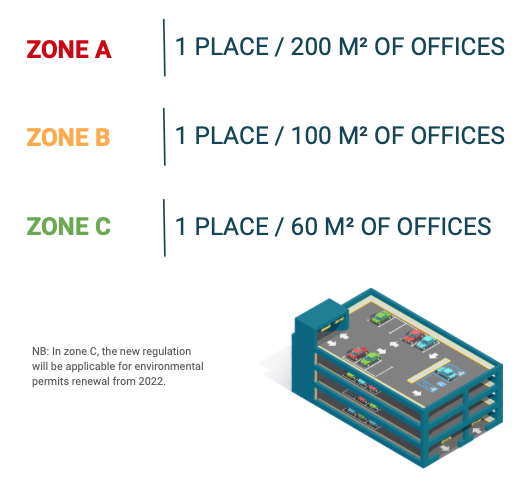Every day, about 200,000 commuters enter Brussels to get to work. These movements exert enormous automotive pressure. And it is precisely to reduce road traffic that Brussels Environment wanted to put an end to the parking spaces reserved for offices and companies. Since 2016, the Brussels Code of Air, Climate and Energy Management (COBRACE) has required private operators of covered and underground parking lots and garages to renew their environmental permits every 15 years.
It is clear that the legislator's objective in this particular case is to discourage workers going to work in the Brussels Capital Region from systematically taking the car to make their commute. In the long term, the hope is to create a pleasant urban space, leaving room for green spaces and public or non-polluting transportation infrastructure. In concrete terms, this regulation, which came into force in 2016, applies to any person or company owning an office building in the Brussels region. Although this regulation is in force for all owners of office buildings in the Brussels region, its impact will not be the same for all buildings. Indeed, its application systematically depends on several factors.
Each property owner is required to renew the environmental permit for his building at the competent department of the Brussels administration every 15 years. Since 2016, this renewal of the environmental permit for office buildings in the Brussels region has included a downward revision of the ratio of authorised parking spaces per office building.
The new maximum number of parking spaces under the COBRACE law is redefined according to two criteria:
The first calculation factor is the accessibility of the office building by public transit, based on areas determined by the administration (A: very well served, B: well served, C: moderately served)
The second calculation factor is the office space (m²) offered by the building for which the renewal of the permit is requested.
Depending on the area, you will be entitled to a different number of parking spaces for your building.

All parking spaces in office buildings located outside the road are affected. This also applies to locations rented by offices in a neighbouring building, even if the use of the neighbouring building is not subject to COBRACE. It is always the end use of the site that determines whether or not it is subject to COBRACE. In other words, if you are a real estate owner or are considering investing in offices, or if your company is based in the Brussels Capital Region and you want to know how these regulations actually apply, this article will certainly be useful to you.
Are not concerned:
COBRACE adapts several environmental and energy regulations (PEB, travel plans, ETS, air, etc.). It fully or partially transposes new directives. It is linked to other important environmental legislation such as ordinances on environmental permits, environmental offences and budget funds.
Download our miniguide to master Cobrace: